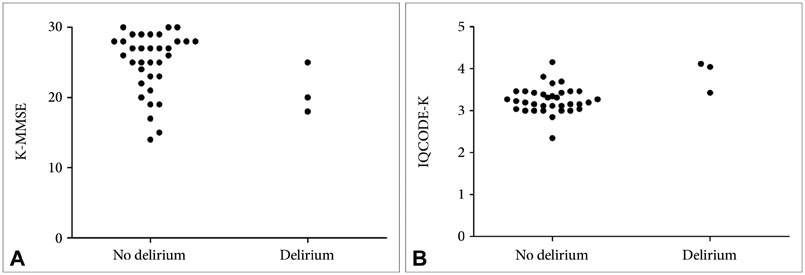Dement Neurocogn Disord.
2015 Sep;14(3):120-122. 10.12779/dnd.2015.14.3.120.
Usefulness of the Informant Questionnaire on Cognitive Decline in the Elderly for Predicting Postoperative Delirium in Elderly Patients: A Pilot Study
- Affiliations
-
- 1Department of Neurology, Seoul National University College of Medicine, Seoul, Korea. neuroksy@snu.ac.kr
- 2Department of Neurology, Seoul National University Bundang Hospital, Seongnam, Korea.
- 3Department of Neurosurgery, Seoul National University College of Medicine, Seoul, Korea.
- 4Department of Neurosurgery, Seoul National University Bundang Hospital, Seongnam, Korea.
- 5Department of Orthopedic Surgery, Seoul National University College of Medicine, Seoul, Korea.
- 6Department of Orthopedic Surgery, Seoul National University Bundang Hospital, Seongnam, Korea.
- KMID: 2442987
- DOI: http://doi.org/10.12779/dnd.2015.14.3.120
Abstract
- BACKGROUND AND PURPOSE
Preexisting cognitive impairment is the strongest risk factor for delirium. We performed a pilot study to investigate whether the Informant Questionnaire on Cognitive Decline in the Elderly (IQCODE), which is a good complement to direct cognitive testing, could be useful for predicting postoperative delirium in elderly patients.
METHODS
Between June 2013 and May 2014, 37 patients aged 70 years or older underwent the Korean version of the Mini-Mental State Examination (K-MMSE) and completed the IQCODE (IQCODE-K) before elective spine surgery in the Spine Center at the Seoul National University Bundang Hospital. Delirium was assessed daily from the day after surgery until discharge. A Mann-Whitney U test was used to compare the K-MMSE scores and the IQCODE-K scores between the groups with and without postoperative delirium.
RESULTS
A total of three of 37 (8.1%) patients developed delirium during their hospital stay. The K-MMSE scores were not different between the two groups (p=0.105), whereas the IQCODE-K scores of patients with delirium were significantly higher than those of patients without delirium (p=0.021), indicating greater cognitive and functional decline over the previous 10 years.
CONCLUSION
The IQCODE may be a suitable tool for assessing preoperative cognitive function and predicting postoperative delirium in elderly patients.
Keyword
MeSH Terms
Figure
Reference
-
1. Inouye SK, van Dyck CH, Alessi CA, Balkin S, Siegal AP, Horwitz RI. Clarifying confusion: the confusion assessment method. A new method for detection of delirium. Ann Intern Med. 1990; 113:941–948.
Article2. Dyer CB, Ashton CM, Teasdale TA. Postoperative delirium. A review of 80 primary data-collection studies. Arch Intern Med. 1995; 155:461–465.
Article3. Inouye SK, Rushing JT, Foreman MD, Palmer RM, Pompei P. Does delirium contribute to poor hospital outcomes? A three-site epidemiologic study. J Gen Intern Med. 1998; 13:234–242.
Article4. Inouye SK. Delirium in older persons. N Engl J Med. 2006; 354:1157–1165.
Article5. Cole MG. Delirium in elderly patients. Am J Geriatr Psychiatry. 2004; 12:7–21.
Article6. Folstein MF, Folstein SE, McHugh PR. "Mini-mental state". A practical method for grading the cognitive state of patients for the clinician. J Psychiatr Res. 1975; 12:189–198.
Article7. Long LS, Shapiro WA, Leung JM. A brief review of practical preoperative cognitive screening tools. Can J Anaesth. 2012; 59:798–804.8. Jorm AF. Assessment of cognitive impairment and dementia using informant reports. Clin Psychol Rev. 2004; 16:51–73.9. Jorm AF. The Informant Questionnaire on cognitive decline in the elderly (IQCODE): a review. Int Psychogeriatr. 2004; 16:275–293.10. Jorm AF, Jacomb PA. The Informant Questionnaire on Cognitive Decline in the Elderly (IQCODE): socio-demographic correlates, reliability, validity and some norms. Psychol Med. 1989; 19:1015–1022.11. Kang Y, Na DL, Hahn S. A validity study on the Korean Mini-Mental State Examination (K-MMSE) in dementia patients. J Korean Neurol Assoc. 1997; 15:300–308.
Article12. Lee DW, Lee JY, Ryu SG, Cho SJ, Hong CH, Lee JH, et al. Validity of the Korean version of Informant Questionnaire on the Cognitive Decline in the Elderly (IQCODE). J Korean Geriatr Soc. 2005; 9:196–202.
Article13. Priner M, Jourdain M, Bouche G, Merlet-Chicoine I, Chaumier JA, Paccalin M. Usefulness of the short IQCODE for predicting postoperative delirium in elderly patients undergoing hip and knee replacement surgery. Gerontology. 2008; 54:116–119.
Article14. Wacker P, Nunes PV, Cabrita H, Forlenza OV. Post-operative delirium is associated with poor cognitive outcome and dementia. Dement Geriatr Cogn Disord. 2006; 21:221–227.
Article
- Full Text Links
- Actions
-
Cited
- CITED
-
- Close
- Share
- Similar articles
-
- Impact of surgical approach on postoperative delirium in elderly patients undergoing gastrectomy: laparoscopic versus open approaches
- Pre and Postoperative Assessment of Depression and Cognitive Dysfunction Aged 65 Years or Older in Department of Surgery
- Postoperative neurocognitive disorders
- Clinical Approach to Delirium in Elderly Patients
- Delirium after Combined Epidural-General Anesthesia in a Elderly Patient: A case report


